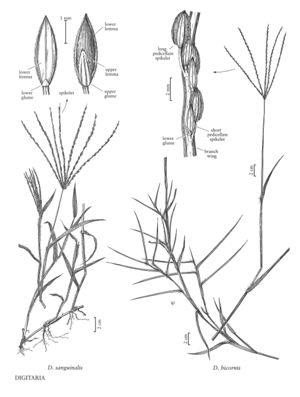Digitaria sanguinalis
Plants annual. Culms 20-70(112), often decumbent and rooting at the lower nodes. Sheaths keeled, usually sparsely pubescent with papillose-based hairs; ligules 0.5-2.6 mm; blades 2-11(14) cm long, 3-8(12) mm wide, usually with papillose-based hairs on both surfaces, sometimes glabrous. Panicles with 4-13 spikelike primary branches, these subdigitate or on rachises to 6 cm; primary branches 3-30 cm long, 0.7-1.5 mm wide, flattened and winged, wings more than 1/2 as wide as the midribs, lower and middle portion of the branches bearing spikelets in unequally pedicellate pairs, pedicels not adnate to the branches; secondary branches rarely present. Spikelets homomorphic, 1.7-3.4 mm long, 0.7-1.1 mm wide. Lower glumes 0.2-0.4 mm long, veinless; upper glumes 0.9-2 mm, 1/3 – 1/2 as long as the spikelets, 3-veined, pubescent on the margins; lower lemmas usually exceeded or equaled by the upper florets, sometimes exceeding them but by no more than 0.2 mm, glabrous, 7-veined, lateral (or all) veins scabrous throughout or smooth on the lower (1/3)1/2 and scabrous distally, 3 middle veins usually widely spaced, remaining veins on each side close together and near the margins; upper lemmas 1.7-3 mm, yellow or gray, frequently purple-tinged when immature, often becoming brown at maturity; anthers 0.5-0.9 mm. 2n = 36, 28, 34, 54.
Distribution
Conn., N.J., N.Y., Wash., Va., Del., D.C., Wis., W.Va., Md., Wyo., N.H., N.Mex., Tex., La., Tenn., N.C., S.C., Pa., Nev., Mass., Maine, R.I., Vt., Puerto Rico, Colo., Calif., Ala., Kans., N.Dak., Nebr., Okla., S.Dak., Ark., Ill., Ga., Ind., Iowa, Ariz., Idaho, Mont., Oreg., Ohio, Utah, Mo., Minn., Mich., Alta., B.C., Man., N.S., Ont., P.E.I., Que., Sask., Miss., Ky.
Discussion
Digitaria sanguinalis is a weedy Eurasian species that is now found in waste ground of fields, gardens, and lawns throughout much of the world, including the Flora region.
Selected References
None.
